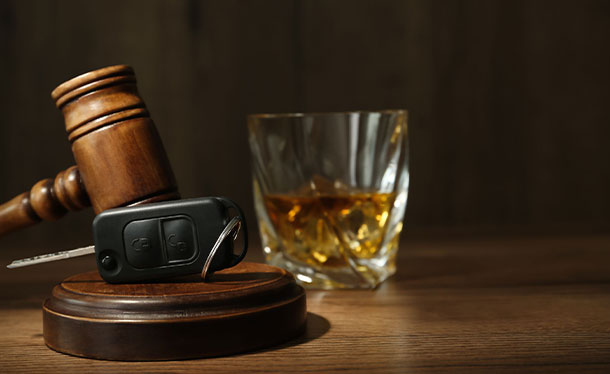First-degree driving while impaired (DWI) is the most serious level of DWI in Minnesota. It is a felony that comes with severe punishments including the possibility of years in prison, thousands of dollars in fines, vehicle forfeiture, driver’s license cancellation, and years of driving restrictions. These direct penalties can also have significant ripple effects such as reduced job prospects, limited housing opportunities, and rejected auto insurance policies.
With the harsh consequences of this offense, it’s critical to protect yourself immediately. Contact our trusted criminal defense attorney as soon as you are arrested or charged with first-degree DWI.
What counts as 1st-degree DWI in Minnesota?
First-degree DWI in Minnesota occurs when a person is driving while intoxicated or with a blood alcohol concentration of .08 or higher, and:
- has had three or more alcohol-related license revocations or DWI convictions in the last 10 years, OR
- has a previous conviction of felony DWI, criminal vehicular homicide, or criminal vehicular operation in their lifetime.
It’s important to highlight that prior DWI convictions aren’t necessary for a first-degree DWI charge. Three alcohol-related license revocations in the last 10 years are enough to elevate a drunk-driving charge to a felony DWI.
For drivers with past DWI arrests – not necessarily convictions – this is a difficult area of the law. License revocation can occur soon after any kind of DWI arrest, whether or not you were guilty of the crime. Your license can be revoked if you don’t successfully challenge it in a license hearing. Once you have a license revocation on your record, it can enhance any subsequent DWI allegations to a more serious charge.
Minnesota law is very strict toward DWI. When your rights and freedom are at risk because of a drunk-driving charge and past DWI allegations, get the help of our experienced DWI defense attorney.
What is the penalty for 1st-degree DWI in Minnesota?
The penalties for a first-degree DWI conviction in Minnesota may include:
- Prison time of up to seven years, with a minimum of six months (sentence can be reduced for first-time offenders)
- Fines up to $14,000
- License cancellation as “inimical to public safety” (we’ll discuss more of this in the next section)
- Vehicle forfeiture
- Impounding of license plate
- Up to six years of possible probation
- Community work service
- Substance abuse counseling or treatment.
It’s possible to reduce the sentence or avoid certain penalties with the help of a competent defense lawyer. For instance, a first-time felony DWI offender may receive a “stayed” prison sentence, meaning they may avoid prison if they complete a probationary period. Alternatively, the minimum six-month jail sentence could be reduced to 30 days in jail with the other 150 days in home monitoring.
How long do you lose your license on a 1st-degree DWI in Minnesota?
If you’ve been charged with a first-degree DWI in Minnesota, you could lose your license for at least four years. This is not a simple license revocation but a license cancellation. You’ll be marked “inimical to public safety,” indicating you’re unable to drive without endangering others – until you finish the license reinstatement process.
The process requires you to complete a chemical dependency treatment program. Once you enroll in the recommended program, you may have a “limited license” for one year, allowing you to drive to work, school, and treatment as long as you have an ignition interlock device installed in your vehicle.
Then, once you complete the treatment program, a “restricted license” allows you to drive to more places but still with an ignition interlock. This restricted license is in effect for three to five years, depending on the severity of your offense.
For the whole four to six years while you’re on a limited and restricted license, you will also get a “B-card” restriction which prohibits you from consuming alcohol at any time, not just before driving. Your license will bear a special mark on the back that lets officers know you’re not supposed to drink alcohol at all.
Upon completion of the four to six years of alcohol abstinence, you’ll be eligible to apply for full driving privileges again. If, however, you’re found to have violated the alcohol abstinence, the whole penalty period will start over.
What to expect at arraignment for 1st-degree DWI in Minnesota
A felony arrest usually means you’ll have to stay in jail until the first court hearing, which is called the arraignment.
At the arraignment, the judge will read the charge(s) against you, state your rights related to the case, then ask for your plea. If you enter a Guilty plea, the judge will give a sentence. If your plea is Not Guilty, the case will proceed to pretrial or trial, with subsequent hearings at a later date.
It is crucial to have a lawyer advise you before you enter any kind of plea. At this early stage, the prosecution may not even have all evidence yet, hence it is unwise to plead guilty at this point.
After hearing your plea, the judge will set your bail. This is your opportunity to legally get out of jail after your arrest.
Contact DWI Defense Attorney Jeff Dean
Getting charged with first-degree DWI can be extremely daunting, given the harsh penalties that Minnesota law imposes. Entrust your case only to a defense lawyer with proven success in this field. Attorney Jeff Dean has been defending Minnesotans in criminal cases for over 26 years, obtaining Not Guilty verdicts, dismissals, favorable plea bargains, and reduced sentences.
Contact Jeff Dean as soon as you face a DUI or DWI charge. Call (612) 805-6916 today.s


